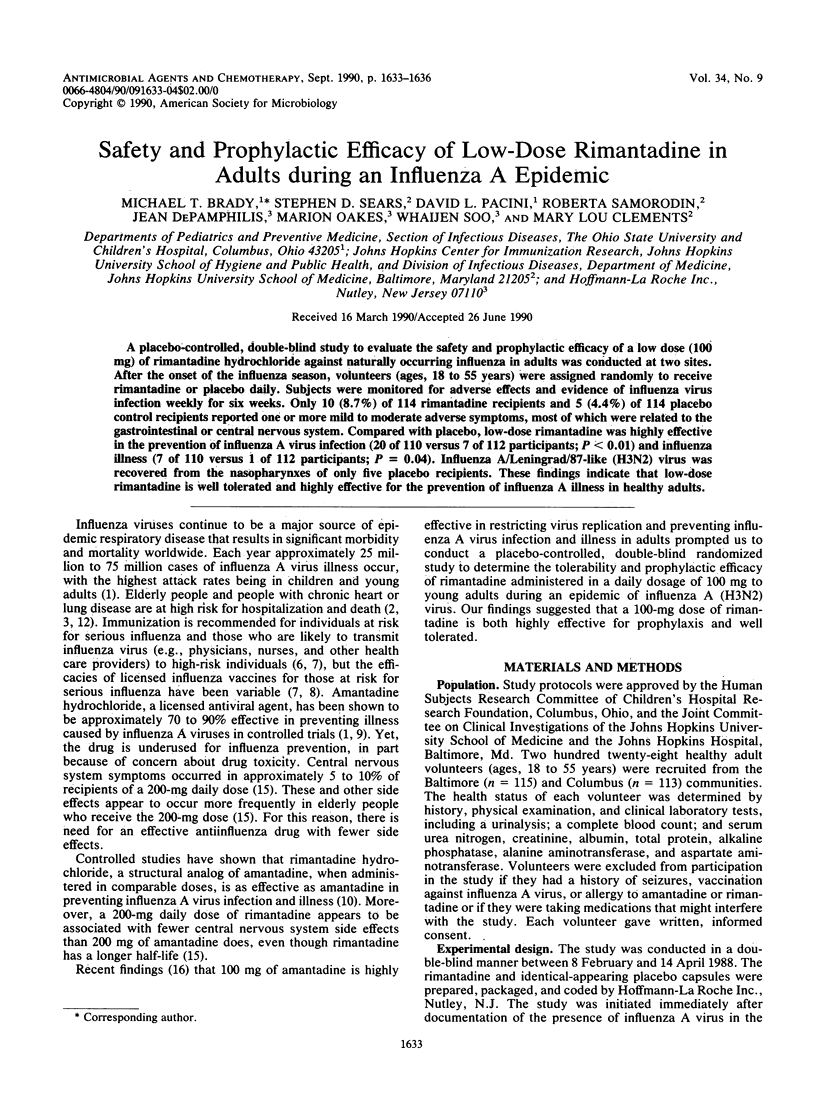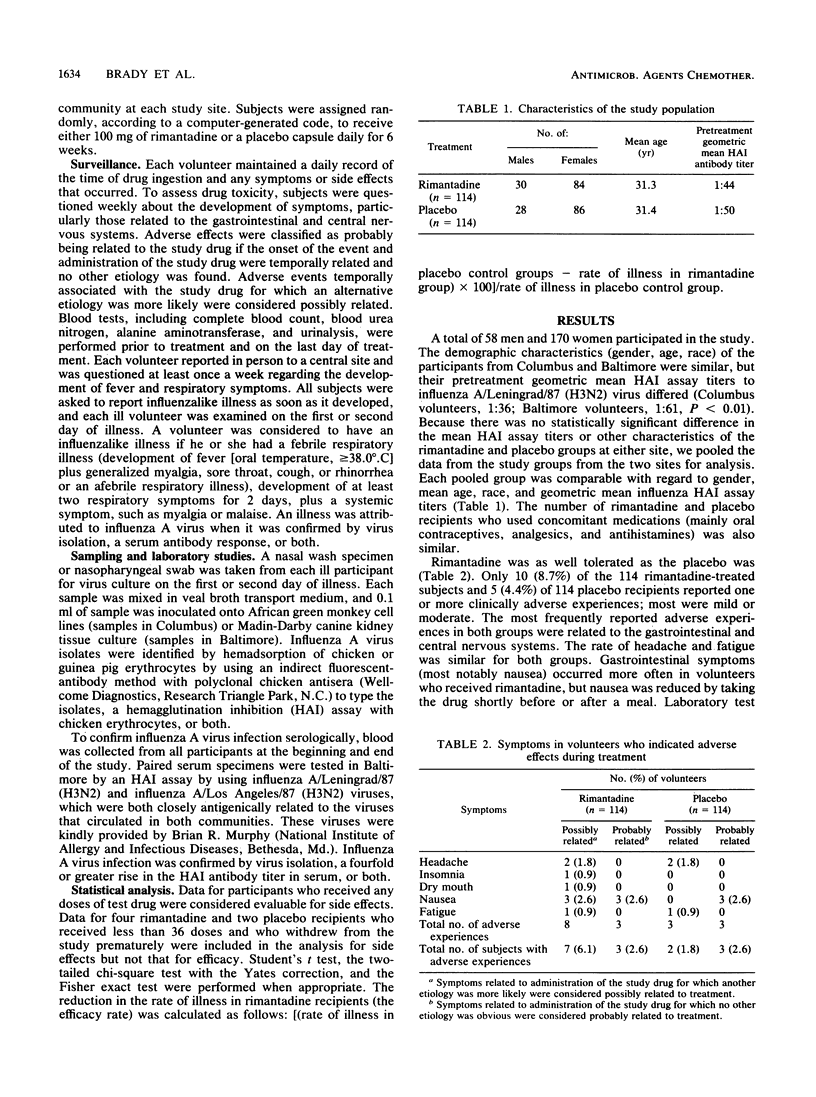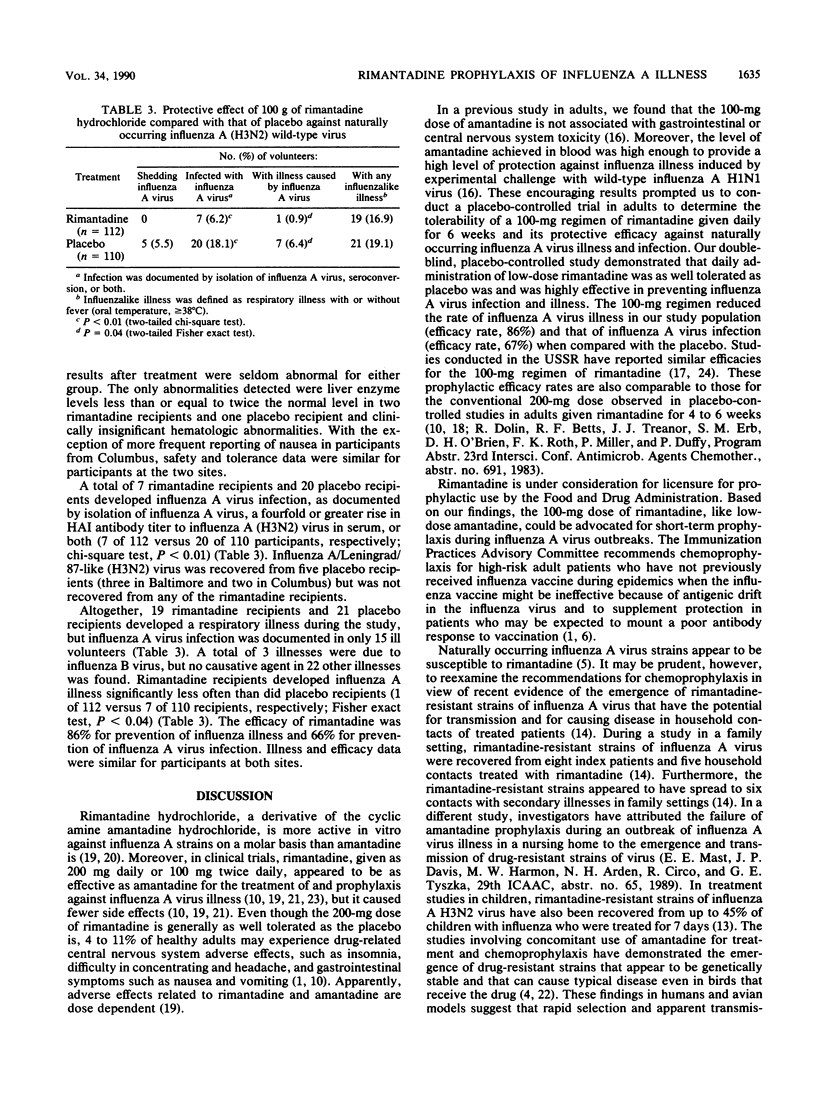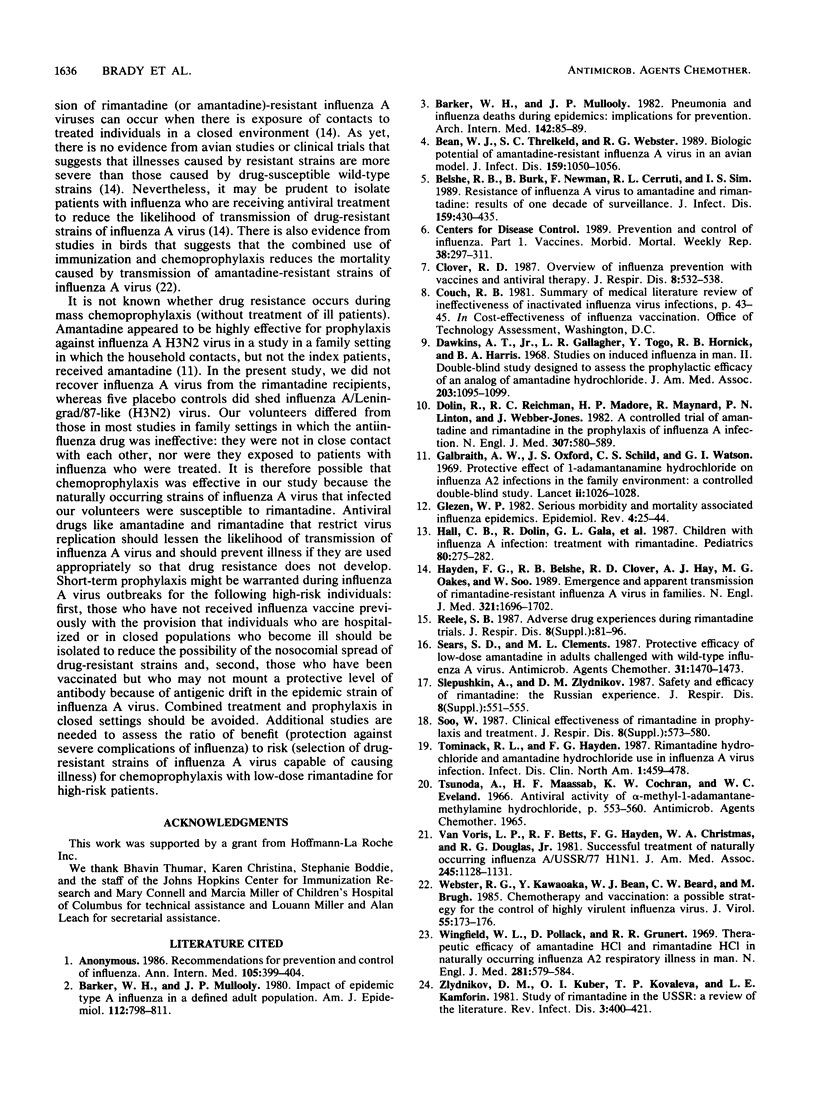Abstract
A placebo-controlled, double-blind study to evaluate the safety and prophylactic efficacy of a low dose (100 mg) of rimantadine hydrochloride against naturally occurring influenza in adults was conducted at two sites. After the onset of the influenza season, volunteers (ages, 18 to 55 years) were assigned randomly to receive rimantadine or placebo daily. Subjects were monitored for adverse effects and evidence of influenza virus infection weekly for six weeks. Only 10 (8.7%) of 114 rimantadine recipients and 5 (4.4%) of 114 placebo control recipients reported one or more mild to moderate adverse symptoms, most of which were related to the gastrointestinal or central nervous system. Compared with placebo, low-dose rimantadine was highly effective in the prevention of influenza A virus infection (20 of 110 versus 7 of 112 participants; P less than 0.01) and influenza illness (7 of 110 versus 1 of 112 participants; P = 0.04). Influenza A/Leningrad/87-like (H3N2) virus was recovered from the nasopharynxes of only five placebo recipients. These findings indicate that low-dose rimantadine is well tolerated and highly effective for the prevention of influenza A illness in healthy adults.
Full text
PDF



Selected References
These references are in PubMed. This may not be the complete list of references from this article.
- Barker W. H., Mullooly J. P. Impact of epidemic type A influenza in a defined adult population. Am J Epidemiol. 1980 Dec;112(6):798–811. doi: 10.1093/oxfordjournals.aje.a113052. [DOI] [PubMed] [Google Scholar]
- Barker W. H., Mullooly J. P. Pneumonia and influenza deaths during epidemics: implications for prevention. Arch Intern Med. 1982 Jan;142(1):85–89. [PubMed] [Google Scholar]
- Bean W. J., Threlkeld S. C., Webster R. G. Biologic potential of amantadine-resistant influenza A virus in an avian model. J Infect Dis. 1989 Jun;159(6):1050–1056. doi: 10.1093/infdis/159.6.1050. [DOI] [PubMed] [Google Scholar]
- Belshe R. B., Burk B., Newman F., Cerruti R. L., Sim I. S. Resistance of influenza A virus to amantadine and rimantadine: results of one decade of surveillance. J Infect Dis. 1989 Mar;159(3):430–435. doi: 10.1093/infdis/159.3.430. [DOI] [PubMed] [Google Scholar]
- Dawkins A. T., Jr, Gallager L. R., Togo Y., Hornick R. B., Harris B. A. Studies on induced influenza in man. II. Double-blind study designed to assess the prophylactic efficacy of an analogue of amantadine hydrochloride. JAMA. 1968 Mar 25;203(13):1095–1099. doi: 10.1001/jama.203.13.1095. [DOI] [PubMed] [Google Scholar]
- Dolin R., Reichman R. C., Madore H. P., Maynard R., Linton P. N., Webber-Jones J. A controlled trial of amantadine and rimantadine in the prophylaxis of influenza A infection. N Engl J Med. 1982 Sep 2;307(10):580–584. doi: 10.1056/NEJM198209023071002. [DOI] [PubMed] [Google Scholar]
- Galbraith A. W., Oxford J. S., Schild G. C., Watson G. I. Protective effect of 1-adamantanamine hydrochloride on influenza A2 infections in the family environment: a controlled double-blind study. Lancet. 1969 Nov 15;2(7629):1026–1028. doi: 10.1016/s0140-6736(69)90639-4. [DOI] [PubMed] [Google Scholar]
- Glezen W. P. Serious morbidity and mortality associated with influenza epidemics. Epidemiol Rev. 1982;4:25–44. doi: 10.1093/oxfordjournals.epirev.a036250. [DOI] [PubMed] [Google Scholar]
- Hall C. B., Dolin R., Gala C. L., Markovitz D. M., Zhang Y. Q., Madore P. H., Disney F. A., Talpey W. B., Green J. L., Francis A. B. Children with influenza A infection: treatment with rimantadine. Pediatrics. 1987 Aug;80(2):275–282. [PubMed] [Google Scholar]
- Hayden F. G., Belshe R. B., Clover R. D., Hay A. J., Oakes M. G., Soo W. Emergence and apparent transmission of rimantadine-resistant influenza A virus in families. N Engl J Med. 1989 Dec 21;321(25):1696–1702. doi: 10.1056/NEJM198912213212502. [DOI] [PubMed] [Google Scholar]
- Sears S. D., Clements M. L. Protective efficacy of low-dose amantadine in adults challenged with wild-type influenza A virus. Antimicrob Agents Chemother. 1987 Oct;31(10):1470–1473. doi: 10.1128/aac.31.10.1470. [DOI] [PMC free article] [PubMed] [Google Scholar]
- Tominack R. L., Hayden F. G. Rimantadine hydrochloride and amantadine hydrochloride use in influenza A virus infections. Infect Dis Clin North Am. 1987 Jun;1(2):459–478. [PubMed] [Google Scholar]
- Van Voris L. P., Betts R. F., Hayden F. G., Christmas W. A., Douglas R. G., Jr Successful treatment of naturally occurring influenza A/USSR/77 H1N1. JAMA. 1981 Mar 20;245(11):1128–1131. doi: 10.1001/jama.245.11.1128. [DOI] [PubMed] [Google Scholar]
- Webster R. G., Kawaoka Y., Bean W. J., Beard C. W., Brugh M. Chemotherapy and vaccination: a possible strategy for the control of highly virulent influenza virus. J Virol. 1985 Jul;55(1):173–176. doi: 10.1128/jvi.55.1.173-176.1985. [DOI] [PMC free article] [PubMed] [Google Scholar]
- Wingfield W. L., Pollack D., Grunert R. R. Therapeutic efficacy of amantadine HCl and rimantadine HCl in naturally occurring influenza A2 respiratory illness in man. N Engl J Med. 1969 Sep 11;281(11):579–584. doi: 10.1056/NEJM196909112811102. [DOI] [PubMed] [Google Scholar]
- Zlydnikov D. M., Kubar O. I., Kovaleva T. P., Kamforin L. E. Study of rimantadine in the USSR: a review of the literature. Rev Infect Dis. 1981 May-Jun;3(3):408–421. doi: 10.1093/clinids/3.3.408. [DOI] [PubMed] [Google Scholar]


